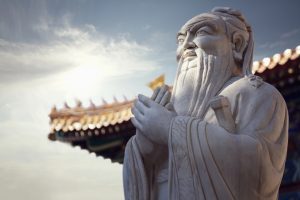The most subversive threat to Xi Jinping’s regime may not come from liberalism but from Confucianism: not the curated slogans in textbooks, but the unassimilated traditions that posit moral authority above the state. This final essay in the Simulated Sagehood series examines how heterodox Confucian frameworks like Jiang Qing’s Political Confucianism have been quietly extinguished.
What survives is a managed inheritance: tradition retained as spectacle, but stripped of its capacity to judge or constrain.
Xi Jinping often invokes the language of Confucianism to project cultural continuity and civilizational depth. But behind the ceremonial vocabulary lies a system of epistemic control – one that quietly disables any version of Confucian thought that could challenge Chinese Communist Party (CCP) supremacy.
The most prominent casualty of this containment is the school of Political Confucianism associated with Jiang Qing. In his 2012 book “A Confucian Constitutional Order,” Jiang envisioned a tricameral legislature: a House of the Nation (rooted in cultural legitimacy), a House of the Worthies (anchored in moral wisdom), and a House of the People (reflecting popular will) – all governed by tianli (Heavenly Principle), not by Marxist historicism or liberal democratic sovereignty.
This model doesn’t just diverge from CCP doctrine; it subverts it. By positing a moral order that transcends politics, it implies that the party is not the final arbiter of truth. That tension was openly acknowledged during the 2010s, when a symposium in the Cambridge Journal of Law & Religion described Jiang’s vision as an attempt to “re-center political legitimacy on a pre-Marxist moral cosmology” – a direct affront to the Leninist idea that the CCP alone defines what is right.
For a time, particularly under Hu Jintao’s relatively more pluralistic leadership between 2004 and 2012, this alternative Confucianism had space to breathe. It appeared in respected journals like Reading (读书), Open Times (开放时代), and the Beijing Cultural Review (北京文化评论). Scholars such as Kang Xiaoguang and Chen Ming proposed civil-service exams based on virtue rather than rote testing, and envisioned ritual-based models of governance as Chinese alternatives to both Soviet-style bureaucracy and Western liberalism. A 2018 issue of Culture and Society looked back on this moment as “the adolescence of mainland New Confucianism” – a moment of possibility that was quickly being eclipsed.
Under Xi, that window has closed. In 2015, internal guidance from the Central Propaganda Department and the National Press and Publication Administration instructed editors to avoid “speculative institutional schemes derived from pre-modern systems” unless they could be reframed in terms of socialist values. The impact was immediate. Jiang’s Guoxue Academy in Guizhou lost its legal registration in 2016. Leading academic journals began quietly rejecting submissions that treated tianli as a living political concept. Searches for “儒教宪政” (Confucian constitutionalism) on CNKI, China’s national academic database, started returning no results.
When a 2017 overseas article revisited the idea of a “House of Sages,” the Global Times fired back with a familiar script, denouncing unnamed “reactionary fantasies” that “smuggle political ambition under antique robes.” The message was clear: any intellectual architecture that implied limits on Xi’s authority would be treated as latent rebellion.
Behind the rhetoric stands real coercive power. The 2018 Party Disciplinary Regulations include “improper discussion” (妄议中央) as a punishable offense – on par with bribery and dereliction of duty. In 2023 alone, over 110,000 officials were formally disciplined; many were cited not for corruption, but for ideological misalignment.
This is not censorship in the classical sense; rather, it resembles a filter. The key terms of Confucian ethics – xiao (filial piety), zhong (loyalty), and he (harmony) – are still present in textbooks and slogans, but only after being gutted of their metaphysical weight. What remains are empty vessels, repurposed to reinforce the logic of Xi Jinping Thought. Meanwhile, any notion of an external moral order – whether tianli, tianming (the Mandate of Heaven), or the right to remonstrate – is treated as illegible. These ideas are simply excluded: from curricula, journals, policy documents, and political imagination.
What has been eliminated, in effect, is not Confucianism as heritage – but Confucianism as judgment. The language of tradition remains, without the possibility that tradition might hold power to account. This elimination doesn’t take the form of persecution. It works through silence, through what is no longer published, no longer taught, no longer translated into institutional reality.

































